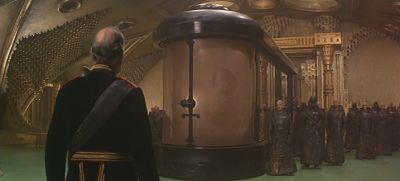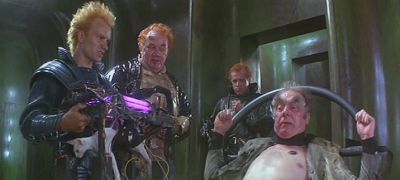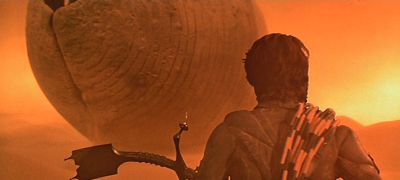Dune
Somewhere between genius and the nut-house lies Arrakis.

Hollywood likes to follow formulas. If one film hits big, immediately commission a few hundred others similar in theme, regardless of quality. Witness the success of X-Men opening a floodgate of comic licences about to hit the multiplexes over the coming year or so. Back in the day, after a little known art-house series, Star Wars was seen by everyone on the planet, the scrabble was on for Sci-fi licences. Some bright studio exec presumably stumbled over Frank Herbert's Dune series, extending over six quite weighty novels, and figured he'd hit a gold mine. It didn't quite pan out that way.
Faced the task of distilling a novel which balanced action with a huge cast of characters, intergalactic politicking, environmental management, Christ imagery as well as the common or garden revenge plot, A curious decision was made; asking David Lynch to adapt and direct. Actually, as he had turned down an opportunity to direct 1983's Return of the Jedi, perhaps not too curious. Lynch's previous works of note were The Elephant Man, a stylish and well-regarded reworking of the plight of John Merrick, and Eraserhead, a stylish mess of a movie with no regard at all for convention. Depending on how he chose to film it, this could be a tightly focused (yet stylish) revenge story for Paul Atriedes, echoing to some extent Luke Skywalker's story of one man joining a rebel army against an imperial army battling overwhelming odds. Alternatively, he could try to condense everything the novel covers into a reasonable running time, his cut eventually running to 137 minutes.
And condense he did, or at least attempt to. Given that Herbert claims that 6 hours version was envisaged at one point with Lynch favouring a four hour solution, and considering the mess made of the extended Alan Smithee television version of the movie, he achieved a remarkable feat. Unfortunately, not remarkable enough to save the movie.
The first concession to running time is also the first scene of the film, a vast swathe of the novel's intricately realised galaxy, ideas and themes introduced in a voice-over by Princess Irulan (Virginia Madsen) of the known universe, daughter of the Padishah Emperor Shaddam the fourth (Jose Ferrer). Bush, put the army away, I said Shaddam, not Saddam. She explains a few of the key concepts, prime being the spice melange, only found on one world, the desert planet of Arrakis, or Dune to its friends. The spice is important as it allows the members of the navigator's guild to 'fold' space, so is vital for intergalactic travel. Clearly Dune is of great strategic significance. The emperor is shown having a meeting with one of the navigators, a beast I can only liken to a melted Mekon, dragged through the splendid palace in a glass enclosed cell filled with spice gas. It's a tremendous visual to regain the viewer's attention after a rather dull voice-over. Over the course of this meeting it becomes clear that the navigator's guild can pull as many strings, if not more than the emperor and that the emperor is in danger of losing the support of the Great Houses of the Landstraad in favour of the popular Duke Leto Atreides (Jurgen Prochnow). He concocts a plan award to award House Atreides the CHOAM company mining contract, then wiping them out using a combination of his own Sardaukar terror troops and the Atreides enemies, the House Harkonnen. If all of that sound meaningless, it's because it is. In the context of the film, none of this is explained, reducing it to a bunch of random terms thrown around in a vain attempt to convey the expanse of the world Herbert created in the novels. The only important thing to come out of this is the enmity betwixt Houses Atreides and Harkonnen.
The story revolves around Paul Atreides (Kyle McLachlan) of the House Atreides, a noble family living on the lovely ocean planet of Caladan. They're packing up their troubles, and armies, in an old kit bag preparing to move to Arrakis. Paul wonders, rightly, why the Emperor is throwing this particular bone their way. His compatriots confirm his suspicions. Mentat Thufir Hawat (Freddie Jones), like all mentats, is capable of incredible speed of though, necessary after the destruction of all thinking machines, and has been training Paul in the ways of the mind. Gurney Halleck (Patrick Stewart) takes care of the combat side of things, and we see a sparring demonstration between them using their knife fighting techniques to overcome personal shields. Also introduced is the weirding modules, a weapon converting vocalisations into energy blasts. These contraptions never appear in the book, and seem only to be there to supply a handy projectile weapon to circumvent the book's limitation on the use of lazguns with those wearing personal shields. Certainly the die-hard fans of the book would question whether the time devoted to these devices couldn't be better spent elsewhere.

Perhaps on the members of the House Harkonnen, for example. We know that they hate the Atreides, but exactly why they're so vociferous about the extermination of them is never adequately explained, or even touched on in passing. This reduces them to little more than pantomime villains, with the audience expected to boo and hiss when they appear on screen. At least Star Wars' Emperor Palpatine had a rebellion to crush to justify his actions, here the Harkonnen are merely inhabitants of the Planet Of The Evil Ginger People, Giedi Prime. The House members include the pie-retaining Baron Vladimir Harkonnen (Kenneth McMillan), a man so huge he requires a levitation belt to hover around in. He floats around making evil statements and threats, and evilly pulls the heart plug from another, presumably evil, ginger person. He's so evil. All of this evility is played to an overacted perfection by McMillan, making sure we at least have someone strong to boo. Also present is The Beast Rabban (Paul Smith), the evil ginger idiot, and evil ginger Feyd-Rautha (Evil Ginger Sting). Rabban is a loathsome character in terms of his actions and in terms of the script. Any characterisation is eschewed in favour of cheap circus tricks, such as drinking the blood of squashed bugs. Quite why the invasion of Arrakis is charged to this incompetent moron remains a mystery. Feyd-Rautha is played with a certain degree of skill by Sting, who will later provide a reasonably effective foil for Paul in the film's close. Again, his character has been truncated hugely from the novel, and he goes from being an almost anti-Paul to a more erudite yet generic Evil Ginger Person.
The Harkonnen show up on Arrakis before the Atreides have had time to get Sky installed and proceed to slaughter them, no surprise given that the Atreides army have the campest march in the known universe. Leto is killed, however the ducal signet ring passes to Paul. This is another important point that is never explained and leaves the audience wondering why such a song and dance is made over this trinket. Paul and his mother, Jessica (Francesca Annis) manage to escape into the desert, after Paul utilises his powers to distract the evil ginger guards sent to kill them. Lady Jessica is a member of the Bene Gesserit, an order of women with mysterious powers of mind control, but without the light sabre element. They are under orders not to bear male children, as they may result in an all-powerful being they call the Kwisatz Haderach, prophesied by some to be a saviour or alternatively a destroyer. Jessica had disobeyed this to give Leto a son, which leads to many ask if "He is the One", thus clearly inspiring The Matrix.
Paul finds refuge amongst the desert people known as the Fremen, living in cave complexes called seitches. They collect moisture in water farms. I wonder if Lucas read Dune at any point. In a surprisingly short time he becomes respected in the Fremen clan system after quickly learning the ways of the Fremen, including the art of calling and riding the massive desert sand-worms, all the while discovering his new powers. The film desperately compresses time here, removing entire chunks of character development, information on the Fremen, the role of the Imperial ecologist / Fremen leader Liet Kynes (a severely under-utilised Max Von Sydow) is reduced to the point of his presence being unnecessary, and Paul's relationships with several vital characters is hamstrung to fit the reduced running time. It's understandable, there's no way all of this could be squeezed in, but could it have been handled better? Peter Jackson's Lord Of The Rings films so far show that vast chunks can be removed or altered and still fit the character of the book. In a way, Lynch has achieved something similar, most who have read the book would say it feels like Dune.
Nevertheless, in this version it feels as though he moves from joining the Fremen to leading them in about a week, and finishing a planet-wide guerrilla warfare programme on the Harkonnen by the Wednesday after. If you've made it this far in the movie, this three or four year period being compressed down probably won't bother you too much. The battle between the forces ends in a suitably climatic fashion, with use of atomics and a final showdown between Paul Atreides and Evil Ginger Sting.

The project is estimated to have cost between $40 and $50 million. It was shot in Mexico over a mind-boggling seventy-five stages. The sand-worms were one of the most advanced special effects around at the time. The scale of the film is epic. The sets are lavishly and beautifully appointed. It has a fine cast and a great score. No one went to see it.
Okay, that's an exaggeration. However the film was a box office flop only making 28th in the years U.S. charts, leaving both critics and audiences cold. Some would argue taking $28 million isn't a flop, but it is a hollow argument when the film doesn't cover it's own costs on it's year of release. Frankly, it deserved this. As a coherent film it tries hard but fails miserably. If you weren't familiar with the book before going in, you'd be utterly lost. If you were, perhaps the quite substantial changes would annoy you, despite the necessity of them. Certainly the ending is extremely odd to anyone familiar with the novel as it's exactly what the Fremen don't want to happen, seemingly trampling over the plot of the novel to provide a nice, but entirely inexplicable visual to end the film on.
I'm torn on how to rate this, because I find it hugely enjoyable, flaws and all. A failure, but a glorious failure. Lynch and other directors like Takashi Miike have show that films don't necessarily have to follow a conventional linear storyline to be great, but the enjoyment here is tempered by this actually being a shadow of a conventional linear story. Even though I can happily sit and watch this, I'm always aware that I'm filling in parts of the story in my mind. However, as the recent TV miniseries shows, slavish adherence to the subject matter doesn't produce great results either. It should be noted that the film version appears to totally reverse position that the book takes on the cult-of-personality / messiah issue. Frank Herbert himself complained that Paul was only a make-believe messiah, who could no more make it rain on Dune than he could flap his arms and fly like an ornithopter.
There's always something to be said for style and sheer visual spectacle, and Dune certainly provides that. It has some of the most elaborate and spectacular sets and costume design committed to celluloid, and the special effects are superb, given the timeframe. As it stands, I'll heartily recommend it for either lovers of the book, or lovers of Lynch's unique brand of insanity. Everyone else may find it a chore to watch, but may get some enjoyment from it too. After all, it's better to have tried and failed than to be Sweet Home Alabama.
Tippy must not fear. Fear is the mind killer. Fear is the little death that brings total obliteration. Tippy must face his fears and award them 3/5 Tippymarks.
DVD Notes:-A reasonable transfer, but could really do with some TLC in a restored version. Avoid the 4:3 extended version, the quality is awful. In terms of extras, we have the trailer, a slide show of images and some well written but superfluous liner notes. An anamorphic version has recently been released in Japan, if that kind of thing sinks your submarine.
Jurgen Prochnow (Leto Atreides)
Francesca Annis (Lady Jessica)
Kenneth McMillan (Baron Vladimir Harkonnen)
Paul Smith (The Beast Rabban)
Patrick Stewart (Gurney Halleck)
Freddie Jones (Thufir Hawat )
Evil Ginger Sting (Feyd-Rautha)